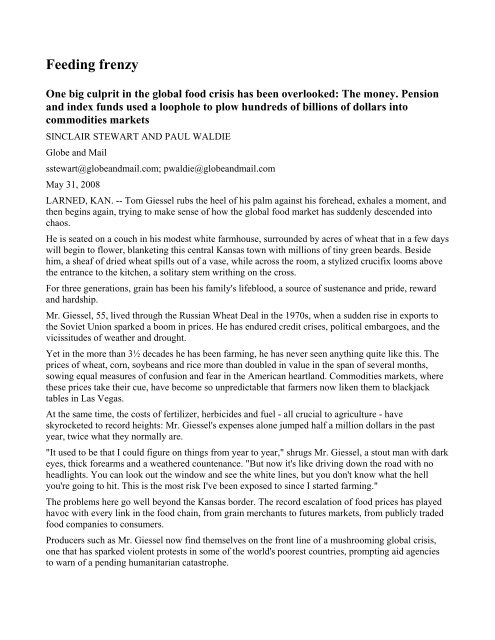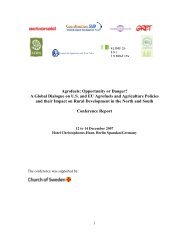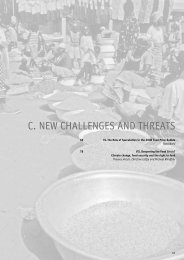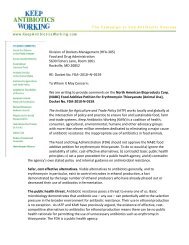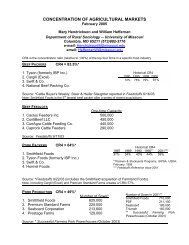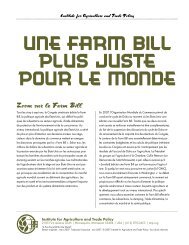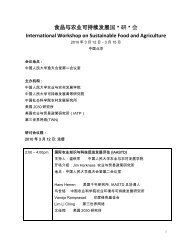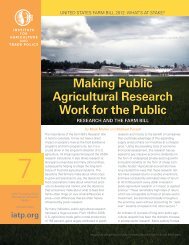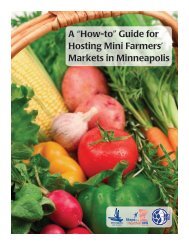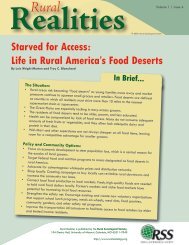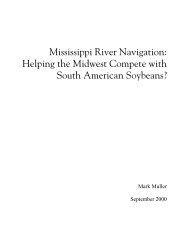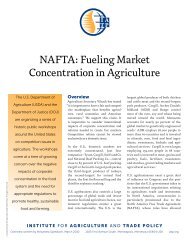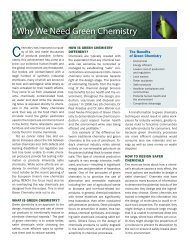Download this document - Institute for Agriculture and Trade Policy
Download this document - Institute for Agriculture and Trade Policy
Download this document - Institute for Agriculture and Trade Policy
You also want an ePaper? Increase the reach of your titles
YUMPU automatically turns print PDFs into web optimized ePapers that Google loves.
Feeding frenzy<br />
One big culprit in the global food crisis has been overlooked: The money. Pension<br />
<strong>and</strong> index funds used a loophole to plow hundreds of billions of dollars into<br />
commodities markets<br />
SINCLAIR STEWART AND PAUL WALDIE<br />
Globe <strong>and</strong> Mail<br />
sstewart@globe<strong>and</strong>mail.com; pwaldie@globe<strong>and</strong>mail.com<br />
May 31, 2008<br />
LARNED, KAN. -- Tom Giessel rubs the heel of his palm against his <strong>for</strong>ehead, exhales a moment, <strong>and</strong><br />
then begins again, trying to make sense of how the global food market has suddenly descended into<br />
chaos.<br />
He is seated on a couch in his modest white farmhouse, surrounded by acres of wheat that in a few days<br />
will begin to flower, blanketing <strong>this</strong> central Kansas town with millions of tiny green beards. Beside<br />
him, a sheaf of dried wheat spills out of a vase, while across the room, a stylized crucifix looms above<br />
the entrance to the kitchen, a solitary stem writhing on the cross.<br />
For three generations, grain has been his family's lifeblood, a source of sustenance <strong>and</strong> pride, reward<br />
<strong>and</strong> hardship.<br />
Mr. Giessel, 55, lived through the Russian Wheat Deal in the 1970s, when a sudden rise in exports to<br />
the Soviet Union sparked a boom in prices. He has endured credit crises, political embargoes, <strong>and</strong> the<br />
vicissitudes of weather <strong>and</strong> drought.<br />
Yet in the more than 3½ decades he has been farming, he has never seen anything quite like <strong>this</strong>. The<br />
prices of wheat, corn, soybeans <strong>and</strong> rice more than doubled in value in the span of several months,<br />
sowing equal measures of confusion <strong>and</strong> fear in the American heartl<strong>and</strong>. Commodities markets, where<br />
these prices take their cue, have become so unpredictable that farmers now liken them to blackjack<br />
tables in Las Vegas.<br />
At the same time, the costs of fertilizer, herbicides <strong>and</strong> fuel - all crucial to agriculture - have<br />
skyrocketed to record heights: Mr. Giessel's expenses alone jumped half a million dollars in the past<br />
year, twice what they normally are.<br />
"It used to be that I could figure on things from year to year," shrugs Mr. Giessel, a stout man with dark<br />
eyes, thick <strong>for</strong>earms <strong>and</strong> a weathered countenance. "But now it's like driving down the road with no<br />
headlights. You can look out the window <strong>and</strong> see the white lines, but you don't know what the hell<br />
you're going to hit. This is the most risk I've been exposed to since I started farming."<br />
The problems here go well beyond the Kansas border. The record escalation of food prices has played<br />
havoc with every link in the food chain, from grain merchants to futures markets, from publicly traded<br />
food companies to consumers.<br />
Producers such as Mr. Giessel now find themselves on the front line of a mushrooming global crisis,<br />
one that has sparked violent protests in some of the world's poorest countries, prompting aid agencies<br />
to warn of a pending humanitarian catastrophe.
In the search <strong>for</strong> answers, pundits have attempted to pin the blame on the usual suspects: rising dem<strong>and</strong><br />
from China <strong>and</strong> India, bad crop conditions <strong>and</strong> booming ethanol production.<br />
Yet one major culprit behind these gyrating markets <strong>and</strong> unprecedented price spikes has been largely<br />
overlooked: the deep-pocketed pension <strong>and</strong> index funds upon which most Canadians <strong>and</strong> Americans<br />
depend <strong>for</strong> their retirements.<br />
These funds have plowed tens of billions of dollars into agricultural commodities as a way to diversify<br />
their assets <strong>and</strong> improve returns <strong>for</strong> their investors.<br />
The amount of fund money invested in commodity indexes has climbed from just $13-billion (U.S.) in<br />
2003 to a staggering $260-billion in March, 2008, according to calculations based on regulatory filings.<br />
Michael Masters, a veteran U.S. hedge fund manager, warned a Senate hearing <strong>this</strong> month that <strong>this</strong><br />
number could easily quadruple to $1-trillion, if pension funds allocate a greater portion of their<br />
portfolio to commodities, as some consultants suggest they are poised to do. Because agricultural<br />
markets are small - relative to stock markets - the amount of cash pouring in gives these funds<br />
substantial clout. Mr. Masters estimated that that these big institutional investors control enough wheat<br />
futures to supply the needs of American consumers <strong>for</strong> the next two years, <strong>and</strong> blamed the "dem<strong>and</strong><br />
shock" from these recent entrants to the commodities markets as arguably the primary factor behind the<br />
sudden take-off in food prices.<br />
"If immediate action is not taken, food <strong>and</strong> energy prices will rise higher still," he told the hearing.<br />
"This could have catastrophic economic effects on millions of already stressed U.S. consumers. It<br />
literally could mean starvation <strong>for</strong> millions of the world's poor."<br />
The massive influx of cash has only occurred in the past few years. But its roots stretch back to the<br />
Reagan era, when a court battle over oil price manipulation set off a domino effect that would<br />
ultimately trans<strong>for</strong>m the arcane world of commodities trading.<br />
Beginning with the energy market, regulators made a series of far-reaching decisions that gradually<br />
loosened oversight of complex commodity derivatives <strong>and</strong> created loopholes <strong>for</strong> large speculators,<br />
allowing them to trade virtually unlimited amounts of corn, wheat <strong>and</strong> other food futures.<br />
Only now, nearly two decades later, are the full consequences of those decisions being felt.<br />
Any more<br />
For months, governments <strong>and</strong> international bodies have been struggling to avert catastrophe. The<br />
United Nations created a special task <strong>for</strong>ce on food security <strong>and</strong> called <strong>for</strong> emergency donations.<br />
Leaders of the world's wealthiest countries are expected to make the food crisis a priority when they<br />
gather <strong>for</strong> a G8 summit in July.<br />
And the U.S. Congress has convened hearings into the matter, as have various other governmental <strong>and</strong><br />
regulatory bodies around the world, all in an attempt to underst<strong>and</strong> how markets <strong>and</strong> prices careened<br />
out of control.<br />
They would do well to ask Fowler West. At a pivotal moment almost 20 years ago, Mr. West warned<br />
that a series of rapid-fire moves to deregulate commodities trading could wreak unintended - <strong>and</strong><br />
perhaps calamitous - effects on these markets.<br />
His alarms went unheeded.<br />
In the early 1990s, Mr. West held a seat as a commissioner on the Commodity Futures Trading<br />
Commission, the U.S. regulator charged with overseeing trading in hundreds of staple items, from corn<br />
<strong>and</strong> wheat to oil <strong>and</strong> cotton. Mr. West was a lifelong Democrat; his boss, CFTC chair Wendy Gramm,
was a devout Republican <strong>and</strong> a believer in the laissez-faire, free-market philosophy espoused by<br />
president Ronald Reagan, who once described her as his "favourite economist."<br />
In the fall of 1990, the two clashed over the CFTC's response to a New York court decision involving a<br />
little-known Bermuda energy company called Transnor Ltd.<br />
Long <strong>for</strong>gotten by most, Transnor paved the way <strong>for</strong> wide-ranging deregulation of commodities<br />
trading, an ef<strong>for</strong>t that helped to spur the rise of Enron Corp. <strong>and</strong> which has enabled the stampede of<br />
large fund speculators into food markets.<br />
In the winter of 1986, Transnor filed suit against some of the world's largest oil companies, alleging<br />
that they manipulated prices on the Brent market, an in<strong>for</strong>mal oil trading system that at the time<br />
determined the daily price of oil.<br />
At first, few paid attention to the lawsuit. That all changed on April 18, 1990, when Judge William<br />
Conner delivered a stunning ruling midway through the trial.<br />
The case hinged on drawing a key distinction: Were the 15-day oil contracts that traded on the Brent<br />
market "<strong>for</strong>ward contracts" or "futures contracts"?<br />
In a <strong>for</strong>ward contract, the buyer <strong>and</strong> seller agree to the price of a commodity <strong>and</strong> a fixed date <strong>for</strong><br />
delivery. A farmer enters into a <strong>for</strong>ward contract with a food company by promising to deliver a certain<br />
amount of grain on a certain date at a certain price. Lawmakers have shied away from regulating<br />
<strong>for</strong>ward contracts under commodity trading laws because they are a fundamental part of how farmers<br />
<strong>and</strong> food companies do business - <strong>and</strong> each agreement is unique.<br />
A futures contract is the same basic agreement, but it trades on an exchange, <strong>and</strong> the buyer rarely - if<br />
ever - takes delivery of the commodities. Instead, futures contracts are used mainly by farmers <strong>for</strong><br />
hedging <strong>and</strong> by investors <strong>for</strong> speculating. These contracts have historically been regulated.<br />
In the Brent case, the difference was crucial, since the Brent market contracts did not trade on any<br />
exchange <strong>and</strong>, in the U.S., were not regulated by the CFTC.<br />
The oil companies, hoping to protect their cozy market, <strong>and</strong> avoid the red tape <strong>and</strong> transparency<br />
requirements of regulation, argued they were <strong>for</strong>ward contracts.<br />
Judge Conner ruled against the companies, effectively rendering all Brent trading in the U.S. illegal.<br />
Within days, international oil companies stopped trading with U.S. companies <strong>and</strong> the entire Brent<br />
market was verging on collapse.<br />
In Washington, oil industry lobbyists descended on the CFTC, seeking to get the regulator to mitigate<br />
Judge Conner's ruling. They found a receptive ear in Ms. Gramm, the commission chair. Ms. Gramm<br />
served as a director at the Office of Management <strong>and</strong> Budget, spearheading a variety of industry<br />
deregulation ef<strong>for</strong>ts be<strong>for</strong>e President Reagan placed her in charge of the CFTC in 1988.<br />
She arrived with other political credentials: her husb<strong>and</strong>, Phil, who is now a senior economic adviser to<br />
presidential c<strong>and</strong>idate John McCain, was a Republican senator from Texas.<br />
Even be<strong>for</strong>e the Transnor case, Ms. Gramm had started pursuing a deregulation agenda at the CFTC. A<br />
year earlier, in 1989, the commission quietly issued a policy statement on swap transactions, deals in<br />
which a buyer of commodities such as a pension fund acts through a middleman or a swap dealer -<br />
usually a bank. The CFTC declared that it wouldn't regulate swap dealers.<br />
The Transnor case represented another crucial win <strong>for</strong> financial speculators such as swap dealers.<br />
When the court decision was h<strong>and</strong>ed down, Ms. Gramm moved quickly to soften the blow to the
energy sector, <strong>and</strong> turned the Transnor decision from an obscure footnote in the history of oil trading<br />
into a critical launching pad <strong>for</strong> a wide-ranging redrawing of the rules of commodities markets.<br />
On Sept. 25, 1990, a policy confirming that the Brent contracts were <strong>for</strong>ward contracts - <strong>and</strong> there<strong>for</strong>e,<br />
outside the scope of CFTC regulation - was put to a vote among CFTC commissioners.<br />
It passed 3 to 1.<br />
Ms. Gramm faced one vocal critic in her push to keep the Brent market unregulated: Fowler West, the<br />
lone 'no' vote.<br />
"It was the way we were doing it, the speed with which we were doing it," Mr. West recalled in an<br />
interview. "It was that kind of an attitude that did open the door up <strong>for</strong> a lot of problems."<br />
Ms. Gramm defends the CFTC's actions, <strong>and</strong> says the commission faced pressure from Congress to act.<br />
Senior CFTC staff, as well as a majority of commissioners, agreed with the interpretation concerning<br />
<strong>for</strong>ward contracts, she noted.<br />
"I don't think it was done too quickly," Ms. Gramm, who now chairs the Regulatory Studies Program at<br />
George Mason University's Mercatus Center, told The Globe <strong>and</strong> Mail in an interview.<br />
Mr. West, meanwhile, wasn't merely outvoted. He was muzzled.<br />
Although he wrote an official dissent after the vote, Ms. Gramm <strong>and</strong> the other commissioners blocked<br />
his views from being published in the CFTC's official record.<br />
Furious, Mr. West retaliated by voicing his concern about the CFTC's moves to the New York State<br />
Bar Association. The regulator, he told the lawyers' group, "may soon be paying a price <strong>for</strong> its<br />
politically expedient statutory interpretation. I doubt that its new <strong>for</strong>ward contract exemption can be<br />
restricted to large international oil <strong>and</strong> trading firms represented by influential lawyers."<br />
He concluded with an ominous warning: "The public, down the road, will suffer from <strong>this</strong> fit of<br />
deregulation, no matter how well intentioned."<br />
Mr. West's remarks were published in a law journal, <strong>and</strong> the ef<strong>for</strong>ts by the CFTC to quiet him stirred a<br />
furor in D.C. legal circles.<br />
Two years later, Congress amended the Commodity Exchange Act to require the CFTC to publish<br />
dissenting opinions.<br />
Into the promised l<strong>and</strong> of deregulation<br />
Much as Mr. West predicted, the Transnor case proved to be a watershed event. The CFTC's embrace<br />
of a narrow definition of a futures contract built on the regulator's earlier promise that it would not<br />
police swap transactions.<br />
Together, these moves opened up a new frontier of commodity trading, enabling financial speculators<br />
to buy <strong>and</strong> sell complex derivatives away from the prying eyes of regulators <strong>and</strong> exchanges.<br />
For these dealers in the late 1980s <strong>and</strong> 1990s, the shrinking CFTC rulebook created a "virtually<br />
regulation-free promised l<strong>and</strong>," Philip McBride Johnson, who was CFTC chairman from 1981 to 1983,<br />
later told a congressional committee.<br />
The vast majority of <strong>this</strong> trading boom occurred in the oil <strong>and</strong> energy markets, both of which are<br />
sufficiently large <strong>and</strong> liquid to accommodate legions of traders.<br />
It wasn't long be<strong>for</strong>e dealers began gravitating toward the smaller agricultural commodities markets as<br />
well.
To get exposure to a broad array of commodities, many institutional investors preferred to invest in an<br />
index that tracked the futures market. These indexes typically comprise a basket of products, from oil<br />
<strong>and</strong> gas to wheat, cotton, <strong>and</strong> precious metals, each given a weighting according to the size of its<br />
individual market.<br />
As funds began making more <strong>and</strong> more index investments, their ownership of food futures increased<br />
correspondingly.<br />
Yet the food markets are a somewhat different beast, with a different set of rules, <strong>and</strong> it wasn't long<br />
be<strong>for</strong>e <strong>this</strong> infusion of money hit another regulatory snag.<br />
For almost 75 years, the CFTC has imposed limits on how much of certain agricultural commodities,<br />
including wheat, cotton, soybean, soybean meal, corn, <strong>and</strong> oats, can be traded by non-commercial<br />
players - that is, investors who are not part of the food industry. So-called "commercial hedgers," like<br />
farmers or food processors, can trade unlimited amounts in order to manage their risk.<br />
The limits were designed to prevent manipulation <strong>and</strong> distortion in what are relatively small markets,<br />
<strong>and</strong> at the same time to allow <strong>for</strong> a small amount of speculative activity, in order to provide liquidity<br />
<strong>for</strong> trading.<br />
For decades, the restrictions didn't pose much of a problem. And then, in 1991, as new money began<br />
pouring in, the playing field suddenly shifted.<br />
Emboldened by the CFTC's laissez-faire approach, a bank approached the regulator <strong>and</strong>, <strong>for</strong> the first<br />
time, requested an exemption from speculative trading limits in an agricultural commodity.<br />
The unnamed bank was acting as a "swap dealer" <strong>for</strong> a pension fund: Essentially, it was a middleman<br />
who helped the pension fund get exposure to commodities. A spokesman <strong>for</strong> the regulator declined to<br />
identify the bank or the pension plan, citing confidentiality requirements.<br />
Underst<strong>and</strong>ing how a swap transaction like <strong>this</strong> works is critical to grasping why the CFTC ultimately<br />
granted an exemption to <strong>this</strong> bank - <strong>and</strong> in so doing, opened a loophole that has since allowed hundreds<br />
of billions of dollars worth of fund money to rush into the commodities markets.<br />
Let's say a pension fund wants to make a large investment in commodities, but the size of that<br />
investment would violate the trading limits on wheat. Rather than invest directly in the futures market,<br />
the fund can invest its money with a middleman, such as a bank, in what is called a swap transaction.<br />
The bank might agree to pay the fund a return on a commodity index - if the index rises 10 per cent in<br />
the next year, the bank will pay out that 10 per cent. But the bank doesn't want to be on the hook <strong>for</strong> 10<br />
per cent, so it hedges its risk by wading into the commodities market, <strong>and</strong> using the fund's money to<br />
buy futures. Essentially, it is buying futures to mirror the per<strong>for</strong>mance of the index, so that if prices<br />
rise, it can pass that gain along to the fund without digging into its own pocket.<br />
It is <strong>this</strong> notion of a middleman that swayed the CFTC. Had the pension fund invested all of its money<br />
directly in futures, it would not be allowed to exceed the trading threshold.<br />
But the swap dealer was a different story. The CFTC ruled that it was only buying futures to hedge its<br />
risk with the pension fund client; there<strong>for</strong>e, much like a food industry hedger, it deserved to be exempt<br />
too.<br />
The move was further evidence of the regulator's h<strong>and</strong>s-off approach under Ms. Gramm. Since that<br />
time, the regulator confirmed it has approved 20 additional exemptions <strong>for</strong> swap dealers, some of<br />
whom may strike agreements with multiple funds.<br />
"The underlying philosophy seemed to be that the big guy could take care of himself <strong>and</strong> there was no<br />
need <strong>for</strong> a lot of regulation," Mr. West recalled.
"It was actually told to me by the chairwoman that these [big companies] don't need us regulating them<br />
<strong>and</strong> hampering them, because they can take care of themselves. That missed the point. The point was,<br />
sure they can take care of themselves - but it wasn't them I was worried about."<br />
Still, despite <strong>this</strong> apparently favourable treatment, many swap dealers <strong>and</strong> derivatives traders remained<br />
nervous: Although the CFTC had provided welcome assurances, the regulator did not have the <strong>for</strong>mal<br />
power to enshrine these exemptions as binding rules.<br />
Brokerage firms, energy traders <strong>and</strong> other financial players aggressively lobbied Congress on the issue,<br />
<strong>and</strong> in 1992, the U.S. government passed new legislation that enabled the CFTC to determine which<br />
derivatives could be considered <strong>for</strong>ward contracts <strong>and</strong> receive exemptions.<br />
Armed with <strong>this</strong> new power, the CFTC quickly h<strong>and</strong>ed out nine different exemptions <strong>for</strong> certain energy<br />
contracts. One of the recipients was a Houston-based pipeline entity called Enron Corp. that was<br />
branching out into the energy trading arena.<br />
In January 1993, just as President Bill Clinton was being inaugurated, Ms. Gramm left the CFTC. Five<br />
weeks later she joined the board of Enron.<br />
Congress, however, wasn't done. In 2000, it introduced an array of exemptions, including one <strong>for</strong><br />
electronic trading of energy contracts. This new rule, which prompted the creation of numerous overthe-counter<br />
trading systems allowing buyers <strong>and</strong> sellers to avoid scrutiny, was later given a nickname:<br />
the Enron Loophole.<br />
Beyond the Enron Loophole<br />
Oddly enough, the CFTC's decision to exempt swap dealers from trading limits did not incite an<br />
immediate rush of fund money into agricultural commodities.<br />
Many pension plans, in particular, were still inherently conservative <strong>and</strong> viewed commodities as a<br />
high-risk playground better suited to speculators.<br />
One of the earliest funds to venture into commodities futures was the Ontario Teachers' Pension Plan. It<br />
began with a tentative $100-million (Canadian) investment in 1997, <strong>and</strong> is now one of the world's<br />
larger commodities investors, with about $3-billion committed.<br />
Not long after Teachers made its first commodities investment, Leo de Bever, then a vice-president<br />
with the fund, acknowledged in a speech at a New York conference that the strategy was<br />
unconventional <strong>for</strong> a fund like his. "We are probably an exception, rather than the rule in North<br />
America," he said.<br />
That didn't last long. Throughout the 1990s, pension funds from Japan to Canada began accumulating<br />
assets at a furious clip. Around the world, the bulging baby boom demographic was contributing record<br />
amounts of new money into pension plans <strong>and</strong> retirement funds. At the same time, pension funds were<br />
freed from the traditional shackles of fixed-income investments, like bonds, which produce low returns,<br />
<strong>and</strong> began depositing cash in stock markets, infrastructure <strong>and</strong> real estate.<br />
This boosted returns, <strong>and</strong> added further bulk to their growing assets. Worldwide institutional fund<br />
assets have soared from around $200-billion (U.S.) in 1980 to over $20-trillion today.<br />
But that growth didn't come without setbacks. The dot-com crash in 2001 wiped out billions of dollars<br />
worth of value, <strong>and</strong> offered a painful lesson in the need <strong>for</strong> further diversification. Suddenly,<br />
commodities emerged as a logical vehicle to help pension plans spread around their risk, <strong>and</strong> at the<br />
same time get a measure of protection against inflation.
It didn't hurt that when pension <strong>and</strong> index funds descended en masse into these markets, they found<br />
ready-made loopholes that enabled them to make much larger investments than they would otherwise<br />
have been able to.<br />
Consider the scale of the increase over the past seven years.<br />
In 2000, long-only speculative investors - that is, investors like these funds who are only betting that<br />
prices will climb higher - had committed about $4.7-billion to commodities, according to figures<br />
compiled by Gresham Investments, a New York firm specializing in commodities. That number has<br />
almost doubled every year since, hitting $80-billion in 2005, <strong>and</strong> $175-billion in 2007. As of today,<br />
most estimates peg total fund investment at approximately a quarter of a trillion dollars. Indeed, a study<br />
<strong>this</strong> month by Greenwich Associates found that almost 40 per cent of commodities investors have only<br />
been active in these markets <strong>for</strong> the past three years.<br />
Meanwhile, as <strong>this</strong> fund money stormed in <strong>and</strong> dem<strong>and</strong> rose, prices <strong>for</strong> a range of food staples, such as<br />
wheat, soybeans <strong>and</strong> corn, began escalating. Between 2000 <strong>and</strong> 2007, the price of wheat increased 147<br />
per cent on the Chicago Board of <strong>Trade</strong>. Over the same period, corn increased 79 per cent <strong>and</strong> soybeans<br />
72 per cent. In the past year, in particular, the price moves have been dramatic.The CFTC's moves to<br />
deregulate the sector, meanwhile, only inspired calls <strong>for</strong> more deregulation. As more funds piled in,<br />
stoking dem<strong>and</strong> <strong>for</strong> agricultural futures contracts, speculators began clamouring <strong>for</strong> more flexibility<br />
with trading limits.<br />
In 2005, the CFTC obliged by exp<strong>and</strong>ing trading limits on the amount of wheat, corn, oats <strong>and</strong><br />
soybeans that traders could buy or sell at any one time on the futures markets.<br />
Then, in 2006, Deutsche Bank <strong>and</strong> another undisclosed index fund operator asked the CFTC to exempt<br />
them from all trading limits, much as it had done <strong>for</strong> swap dealers.<br />
The CFTC didn't provide an outright exemption, but gave these two funds pretty much the same thing:<br />
a "no-action letter," assuring the funds that they would not be subject to penalties if they breached the<br />
limits.<br />
Last fall, after other funds began jockeying <strong>for</strong> similar treatment, the regulator issued a proposal to<br />
offer index <strong>and</strong> pension funds full exemptions, meaning they wouldn't have to go through a swap dealer<br />
to circumvent trading limits. The CFTC also asked <strong>for</strong> comments on a proposal to once again raise<br />
trading limits <strong>for</strong> speculative investors, such as hedge funds.<br />
For many in the food industry, who had begun to suspect a strong link between the market's wild<br />
swings <strong>and</strong> <strong>this</strong> influx of new fund money, <strong>this</strong> was the last straw.<br />
The One Hundred Years War<br />
On a Tuesday morning in late April, a group of more than 100 people shoehorned themselves into a<br />
cramped conference room in the Washington headquarters of the CFTC. There were farmers <strong>and</strong><br />
bakers, brokers <strong>and</strong> stock exchange officials, pension fund executives, professors, <strong>and</strong> even cotton<br />
growers, all convening <strong>for</strong> what was, by any measure, an extraordinary meeting: In the midst of<br />
skyrocketing prices <strong>for</strong> food <strong>and</strong> unheard of gyrations in futures contracts, the chief commodities<br />
regulator was trying to figure out whether the markets it oversees still worked properly.<br />
Almost immediately, fault lines emerged between the "commercial" players - farmers, grain elevators,<br />
processors, <strong>and</strong> anyone else directly involved in the food chain - <strong>and</strong> "speculators" - index funds,<br />
pension plans, hedge funds, <strong>and</strong> other investors who buy futures to bet on price movements, but who<br />
never intend to take physical possession of the commodity.
One by one, the commercials took their turn at the microphone, ticking off a laundry list of grievances:<br />
Prices were moving too quickly <strong>and</strong> unpredictably; grain elevators were at their credit limit, depriving<br />
farmers of a primary source of hedging risk.<br />
And, <strong>for</strong> some mysterious reason, the price of the futures contract was not converging with the<br />
underlying price of the cash commodity it represented when that contract drew close to expiration.<br />
Can a market be trusted if prices soar the same day reports come out showing that there is an<br />
oversupply of that product, they asked. Is the market sound when prices shoot up 85 per cent in a<br />
matter of days <strong>and</strong> then fall back down again <strong>for</strong> no apparent reason? Almost to a person, these<br />
commercials laid a large portion of the blame at the feet of investment funds, particularly the pensions<br />
<strong>and</strong> indexers who are able to skirt trading limits.<br />
Many in the food industry complained that these index funds don't behave like traditional speculators in<br />
commodity markets. Unlike hedge funds, which actively buy <strong>and</strong> sell contracts, <strong>and</strong> make bets on price<br />
increases <strong>and</strong> decreases, index funds are passive investors. They take positions in various commodities<br />
<strong>and</strong> hang on <strong>for</strong> extended periods, betting that prices will continue to go up. Critics claim that <strong>this</strong> has<br />
resulted in a kind of hoarding, <strong>and</strong> that the market no longer reacts the way it should to supply <strong>and</strong><br />
dem<strong>and</strong> factors.<br />
"It's the National Corn Growers Association's opinion that large funds have an overwhelming influence<br />
in these markets," Gary Niemeyer, a representative <strong>for</strong> the NCGA, told the roundtable. "This thing is<br />
just getting totally out of h<strong>and</strong>. The money is unreal."<br />
Few were more pointed in their criticisms than the cotton growers. Cotton isn't part of the global food<br />
crisis, nor is it suffering from diminished supplies. Yet in one 90-minute stretch <strong>this</strong> spring, the futures<br />
<strong>for</strong> <strong>this</strong> commodity jumped a full 25 per cent, confounding just about everyone in the industry.<br />
Cotton volatility was held up as one of the clearest signs to date that soft commodity prices have<br />
become unhinged from market fundamentals, <strong>and</strong> may instead be reacting to the moves of large fund<br />
traders.<br />
"This makes no sense," complained Billy Dunavunt, the long-time chairman of Dunavunt Enterprises,<br />
<strong>and</strong> the closest thing to a living legend the industry possesses. "The market is broken, it's out of whack,<br />
<strong>and</strong> someone has got to step in <strong>and</strong> give some relief."<br />
The funds, not surprisingly, dismissed these charges as baseless, <strong>and</strong> argued their involvement added<br />
liquidity to the market, enabling farmers <strong>and</strong> food producers to offload unwanted risk.<br />
"I did not see a convincing case that index money has changed the stated objectives of <strong>this</strong> market,"<br />
insisted Bob Grier, a fund manager at Pimco, one of the biggest players in the agricultural commodities<br />
market.<br />
The odd thing is, <strong>this</strong> meeting could have occurred 150 years ago, <strong>and</strong> it wouldn't have seemed out of<br />
place.<br />
The modern-day commodities market was born in 1848, when 82 merchants b<strong>and</strong>ed together to create<br />
the Chicago Board of <strong>Trade</strong>. Until that point, the grain trade was unpredictable, at best, <strong>and</strong> utter chaos,<br />
at worse.<br />
Buying did not take place in any organized fashion, <strong>and</strong> individual farmers tended to transact with<br />
separate parties, leading to wide discrepancies in pricing. Because farmers typically sold their wares<br />
after harvest, the glut of grain often resulted in low prices.<br />
Chicago, with its nascent railway lines <strong>and</strong> proximity to the Great Lakes <strong>and</strong> Midwestern farming<br />
country, was a natural place to bring everyone together. For the first time, farmers could manage their
isk in a systematic way: They would agree with a buyer to deliver grain, at some specific date in the<br />
future, at a specific price.<br />
This was a <strong>for</strong>ward contract. But it wasn't until almost 20 years later, in 1865, that a proper futures<br />
market took shape.<br />
So popular did these contracts become in the late 19th century that hundreds of exchanges began<br />
popping up across the United States, specializing in everything from butter <strong>and</strong> eggs to wheat, cotton<br />
<strong>and</strong> livestock.<br />
Soon, speculators began to pour into the market, making bets on whether commodities would rise or<br />
fall in value. They never had to take possession of the commodity, but could buy a future at one price,<br />
<strong>and</strong> then sell it days, weeks, or months later.<br />
Almost from the start, there was controversy. "There was an orgy of speculation <strong>and</strong> market<br />
manipulation during the Civil War," Dan Morgan wrote in his book the Merchants of Grain. "The<br />
Board printed rules governing trading in 1869, but abuses of all kinds continued - fraud, bribery of<br />
telegraph operators to obtain confidential in<strong>for</strong>mation (until coded messages were used), <strong>and</strong> the<br />
spreading of false rumours to influence prices. Outside the trading floor at Jackson <strong>and</strong> La Salle streets,<br />
bucket shops, not much different from bookie joints or other gambling establishments, flourished."<br />
In Canada, meanwhile, farmers were so upset they pushed the government to create a national cooperative<br />
in order to avoid selling grain through futures markets altogether. Those ef<strong>for</strong>ts led to the<br />
<strong>for</strong>mation of the Canadian Wheat Board in 1935.<br />
Even today, North American farmers view speculators as gamblers, exchanging pieces of paper in<br />
hopes that prices will move the way they want them to, but never getting their h<strong>and</strong>s dirty with the<br />
physical product.<br />
Yet, despite <strong>this</strong> uneasy symbiosis, most would agree that speculation per<strong>for</strong>ms a vital role in the<br />
markets: If farmers or food producers want to hedge against their risk by selling a futures contract -<br />
say, to deliver wheat a year from now at $8 a bushel - they need speculators who are willing to buy the<br />
contract in a bet that prices will rise by the delivery date.<br />
The question, going back to the infancy of the markets, was one of balance: How much speculation was<br />
necessary to allow the markets to function smoothly?<br />
After the First World War, when wheat prices plunged, the farming industry blamed the speculators,<br />
accusing them of using short-selling tactics to drive down the market. Widespread instances of market<br />
manipulation, meanwhile, incited Congress to introduce bills attempting to eliminate futures trading<br />
altogether.<br />
Although they were narrowly defeated, problems in the market highlighted the need <strong>for</strong> improved<br />
regulation, leading first to the Grain Futures Act of 1922, <strong>and</strong> then to the Commodities Exchange Act<br />
of 1936. The latter exp<strong>and</strong>ed the scope of regulation to cover other commodities, including cotton, <strong>and</strong><br />
<strong>for</strong> the first time imposed limits on speculators to prevent manipulation or distortion of the market.<br />
In other words, non-commercial traders in the futures market could only buy a certain amount of wheat,<br />
corn <strong>and</strong> other products covered under the act.<br />
The measures were put in place to protect farmers, who have a couple of ways to manage their risk:<br />
They can participate directly in the futures market, or they can enter into a <strong>for</strong>ward contract with a<br />
grain elevator, who promises to buy their crop at a certain price. (Canadian farmers sell most of their<br />
wheat through the wheat board, but they use a similar system <strong>for</strong> selling other crops, including canola).
Directly trading in futures isn't all that popular <strong>for</strong> farmers, owing both to the complexity of the futures<br />
market <strong>and</strong> the capital required to manage a trading position.<br />
Most farmers, like Mr. Giessel in Kansas, choose to enter <strong>for</strong>ward contracts with grain elevators. Last<br />
September, <strong>for</strong> instance, he struck an agreement with a local co-op to sell a third of his 2008 wheat<br />
crop at $5.30 a bushel: a price that looked good at the time, <strong>and</strong> that looked horrible in the spring, when<br />
wheat moved close to $13. The grain elevator, once armed with <strong>this</strong> agreement, immediately sells<br />
futures in the market at roughly the same price to minimize its risk.<br />
But here's the rub: Every time the futures price rises, the elevator must post an equivalent amount of<br />
money in the <strong>for</strong>m of margin - a kind of goodwill bond in case the farmer has a problem delivering the<br />
physical crop.<br />
That's fine if the price of wheat nudges up a few nickels. But when an elevator sells a futures contract<br />
at $6 a bushel, <strong>and</strong> that price doubles, it must then post an additional $6 worth of margin on every<br />
bushel. That means going to the bank <strong>for</strong> a very big loan, which is easier said than done in today's<br />
credit environment.<br />
"A year ago, we're sitting here with a $7-million line of credit," said Kim Barnes, a hulking man who<br />
works as an assistant manager with the Pawnee County Co-op. "Now it's over $19.5-million. And our<br />
interest costs have gone from $7-million last year to $14-million <strong>this</strong> year. Last year, because we were<br />
in uncharted waters, the banks allowed you to come back to the well. But we've all been told <strong>this</strong> year<br />
that you've got to live within your means."<br />
Translation? Most elevators will only accept futures contracts <strong>for</strong> <strong>this</strong> year, <strong>and</strong> won't offer contracts to<br />
farmers looking to lock in prices <strong>for</strong> their 2009 or 2010 crop, depriving them of a common risk<br />
management tool. Some elevators are only offering contracts 60 days out, while a few unlucky ones<br />
have fallen into insolvency, unable to meet margin calls as prices accelerated to record levels.<br />
As if <strong>this</strong> unpredictability weren't bad enough, key input costs like fertilizer, fuel <strong>and</strong> herbicide have<br />
soared, affecting farmers on both sides of the border. These inputs are a bit like taxes: Once they go up,<br />
they stay up, regardless of whether commodity prices fall again, as they have already done in the wheat<br />
market. That can take a big bite out of profit if the commodities don't remain at their current high<br />
levels.<br />
For farmers, <strong>this</strong> sudden unpredictability is proof that commodities markets are no longer doing what<br />
they were supposed to do. "The commodity market was designed to provide a <strong>for</strong>ward pricing tool to<br />
protect ourselves," said Ian Wishart, a farmer in western Manitoba, "not to provide an opportunity <strong>for</strong><br />
someone else to make profits."<br />
In the lead up to the April meeting in Washington, the CFTC resisted the idea that ballooning fund<br />
investments were responsible <strong>for</strong> the dramatic upswing in commodity prices.<br />
Yet given the outpouring of concern from farmers, the regulator wasn't taking any chances. At the<br />
meeting, acting chairman Walt Lukken said the CFTC would temporarily shelve plans to move ahead<br />
with two proposals: Raising the limits, once again, <strong>for</strong> speculative traders like hedge funds, <strong>and</strong><br />
<strong>for</strong>malizing an exemption from any trading limits <strong>for</strong> index funds.<br />
"I will be very cautious about moving <strong>for</strong>ward with such initiatives at <strong>this</strong> time," Mr. Lukken said. "I<br />
believe that be<strong>for</strong>e acting, <strong>this</strong> agency must be certain that additional speculative pressures will not<br />
exacerbate the anomalies we are experiencing in these markets."<br />
All Roads Lead to Rome
Next week, international leaders will gather in Rome <strong>for</strong> the High-Level Conference on World Food<br />
Security, hosted by the UN Food <strong>and</strong> <strong>Agriculture</strong> Organization, in an ef<strong>for</strong>t to bring the spiralling food<br />
crisis under control.<br />
In a report leading up to the summit, the UN warned that 22 countries, including Eritrea, Niger,<br />
Comoros, Haiti <strong>and</strong> Liberia, are particularly vulnerable to the recent rise in food prices, <strong>and</strong> the agency<br />
is calling <strong>for</strong> urgent measures to ensure the world's poorest citizens have af<strong>for</strong>dable access to food.<br />
The UN has also acknowledged that the speculative money flowing into commodities markets could be<br />
wreaking havoc with prices, joining officials from other international bodies, including the World<br />
Bank, in drawing attention to the problem.<br />
In the face of stiff criticism from U.S. agriculture <strong>and</strong> <strong>this</strong> widening concern abroad, current <strong>and</strong> <strong>for</strong>mer<br />
CFTC officials have insisted the massive movement of investors into commodities has not distorted the<br />
markets.<br />
Ms. Gramm claimed that deregulation <strong>and</strong> changes to the futures market have nothing to do with<br />
today's rising food prices. That notion, she said, "is just plain flat wrong."<br />
"Volatility in the futures market doesn't cause prices [to rise]," she said. "Futures markets are an<br />
indicator of what's going on in the cash market, not vice versa."<br />
Senator Carl Levin, a Michigan Democrat who heads a subcommittee that is probing commodities<br />
prices, disputes <strong>this</strong> point of view. The CFTC, he said <strong>this</strong> week, hasn't addressed the issue of how <strong>this</strong><br />
influx of money into futures markets has affected price.<br />
"You monitor, you update, you study, <strong>and</strong> then you don't do a darn thing about it," Mr. Levin said.<br />
Amid <strong>this</strong> controversy, there remains a growing sense that the CFTC will have to implement some<br />
measure of added regulation to address concerns about soaring prices.<br />
In the aftermath of the subprime mortgage debacle, U.S. lawmakers are trying to usher in a new era of<br />
regulation <strong>and</strong> scrutiny - one that dem<strong>and</strong>s far greater transparency on exotic derivative instruments,<br />
whether they be tied to the housing bubble or the commodities markets.<br />
This month, the Senate passed legislation aimed at closing the Enron loopholes <strong>and</strong> bringing electronic<br />
energy trading under the purview of the CFTC. Facing growing pressure to rein in soaring prices, the<br />
CFTC announced Thursday that it is investigating possible manipulation of crude oil prices by traders.<br />
More than one farmer has pointed to the Federal Reserve's assistance in helping JPMorgan to buy<br />
troubled brokerage firm Bear Stearns, <strong>and</strong> openly wondered why the U.S. government couldn't make a<br />
similar intervention in the food market. Many would say the stakes are higher, <strong>and</strong> carry with them<br />
something of a moral obligation.<br />
"The tsunami they refer to as the food crisis should be the wake-up call to all of us that we have to get<br />
our priorities right," said Diana Klemme, a vice-president <strong>and</strong> grain division director at Grain Service<br />
Corp., an Atlanta firm that advises farmers on risk management.<br />
"It's not just about the Kansas wheat crop, or the Iowa corn crop," she said. "This is about the world.<br />
And it's hard <strong>for</strong> us to step back <strong>and</strong> say we have to put <strong>this</strong> in context."<br />
Even farmers like Mr. Giessel, preoccupied as they are with pressing concerns at home, readily<br />
acknowledge that the problems with commodities trading resonate far beyond the heartl<strong>and</strong>.<br />
"We're commoditizing everything, <strong>and</strong> losing sight that it's food, that it's something people need," he<br />
said. "We're trading lives."<br />
TIMELINE
1848<br />
82 businessmen <strong>for</strong>m the Chicago Board of <strong>Trade</strong> (CBOT) <strong>for</strong> producers, buyers <strong>and</strong> sellers of grain.<br />
1865<br />
CBOT develops futures contracts <strong>for</strong> grains. Hundreds of other futures markets spring up across the<br />
U.S., including the Butter <strong>and</strong> Cheese Exchange in New York (which later became the New York<br />
Mercantile Exchange) <strong>and</strong> Chicago Butter <strong>and</strong> Egg Board (later changed to Chicago Mercantile<br />
Exchange).<br />
1887<br />
Winnipeg Grain <strong>and</strong> Produce Exchange founded (renamed Winnipeg Commodity Exchange in 1972).<br />
Operated as a cash market only <strong>for</strong> the first 18 years be<strong>for</strong>e becoming a futures market.<br />
1905<br />
Grain Growers Grain Co. Ltd. created in Saskatchewan as a co-operative <strong>for</strong> farmers.<br />
1917<br />
Wheat futures trading suspended on the Winnipeg exchange, leading the federal government to create<br />
the Canadian Wheat Board two years later.<br />
1920<br />
Canadian Wheat Board disb<strong>and</strong>ed.<br />
1922<br />
U.S. passes Grain Futures Act in response to widespread manipulation in the futures markets. The law<br />
cracked down on "excessive speculation" <strong>and</strong> established a framework <strong>for</strong> regulated commodity<br />
exchanges.<br />
1923<br />
Wheat pools created in Alberta, Saskatchewan <strong>and</strong> Manitoba to market grain <strong>for</strong> farmers.<br />
1935<br />
Canadian Wheat Board re-established by the federal government to market grain.<br />
1936<br />
U.S. enacts Commodity Exchange Act to broaden regulations to include trading in other agricultural<br />
commodities, including cotton, butter <strong>and</strong> eggs.<br />
1943<br />
The CWB is granted a monopoly to sell prairie farmer's wheat; wheat trading on the Winnipeg<br />
exchange suspended.<br />
1958<br />
Agricultural Stabilization Board created in Canada to provide price support to farmers in various<br />
commodities.<br />
1972<br />
Farm Products Marketing Agencies Act enacted in Canada, leads to the creation of marketing boards<br />
<strong>for</strong> dairy <strong>and</strong> poultry products.
1974<br />
U.S. government creates the Commodity Futures Trading Commission (CFTC) to regulate commodity<br />
exchanges.<br />
1989<br />
CFTC issues a "swaps policy statement," saying it would not seek to regulate over-the-counter swap<br />
transactions.<br />
1990<br />
Transnor decision prompts CFTC to rule that Brent North Sea contracts are <strong>for</strong>ward contracts <strong>and</strong> not<br />
subject to regulation.<br />
1997<br />
Ontario Teachers' Pension Plan becomes one of the first pension plans to invest in commodities, with a<br />
$100-million investment.<br />
2000<br />
Commodity Futures Modernization Act in the U.S. codifies exemptions <strong>and</strong> exclusions <strong>for</strong> various<br />
energy <strong>and</strong> financial derivatives from CFTC oversight.<br />
Intercontinental Exchange created in Atlanta as an electronic energy trading plat<strong>for</strong>m.<br />
2005<br />
CFTC exp<strong>and</strong>s position limits in wheat, corn <strong>and</strong> soybean trading <strong>for</strong> speculators.<br />
2006<br />
CFTC grants index funds exemptions from position limits imposed on speculators.<br />
2008<br />
In February, prices <strong>for</strong> some wheat contracts surge 85 per cent on Minneapolis Grain Exchange.<br />
Trading is so heavy the contract hits daily limits 12 times, <strong>for</strong>cing the exchange to exp<strong>and</strong> them.<br />
Paul Waldie


